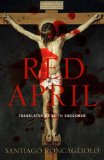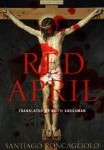
Translated from the Spanish by Edith Grossman
Winner of 2006 Alfaguara Prize
Red April appealed to me for a number of reasons. The fact that the author was the youngest person ever to win the Alfaguara Prize (the most prestigious award for Spanish Literature) intrigued me. This, along with comparisons to Roberto Bolaño and a translation from the Queen of Spanish literature, Edith Grossman, had me requesting a copy from the publisher. I’m really pleased that I did as it is a fantastic book.
Red April is set in Peru and follows an unambitious police prosecutor who finds himself at the centre of a bizarre murder investigation. The corruption and unstable political situation of the country make the task of discovering the murderer even harder, especially when he discovers that few people are interested in the truth.
The book reminded me of 2666, but the crucial difference between the two is that things actually happen in Red April.
The plot is fast paced and reaches a satisfactory conclusion, successfully combining a complex thriller with deeper political commentary.
“The party has a thousand eyes and a thousand ears,” said Durango, smiling with inexpressive eyes fixed on those of the prosecutor. “They’re the eyes and ears of the people. It is impossible to lock up and kill all the people, somebody’s always there. Like God. Remember that.”
The religious beliefs of the Peruvians are also covered – I loved learning about their rituals and festivals. If nothing else this book taught me a lot about their way of life.
If I had to make a few small criticisms it would be that the political situation isn’t fully explained. This means that prior knowledge (or a bit of googling!) is required to fully appreciate some sections.
The characters are also hard to love. All of them commit some form of evil during the course of the book. This means that it isn’t possible to empathise with anyone – you have to simply enjoy the story telling without connecting with anyone on a personal level.
Overall, this is an impressive debut novel that I’d highly recommend to fans of Roberto Bolaño or similar Spanish literature.

23 replies on “Red April – Santiago Roncagliolo”
I’ve been looking forward to your review on this as it sounded right up my street. I find I end up googling or going on Wikipedia on most books I read these days, I quite enjoy doing it so I’m not complaining.
Jessica, I don’t google much when reading, but I do know that that doing so often improves the reading experience. Knowing the full history really helps to give a book that added depth.
How very strange – I had Red April quoted to me on a post I made on Year Zero this morning. I think it must be a sign. And your likening it to Bolano has about sealed the fate of how I will spend my lunchtime. This also sounds very like The Secret and the Voices by Carlos Gamerro (not yet available in translation, but coming next yera from Pushkin Press) – I was at a reading he gave from the book last night. If I were superstitious I’d say someone wanted me to buy this book!
Dan, It does look as though fate is telling you to read this one!! I hope that you enjoy it.
I’ll keep an eye out for The Secret and the Voices – I do love books like this.
30 pages to go (I was the one quoted it on Dan’s blog) and I am loving it. To my mind you are so right, because it is more grounded in real place and time than 2666, I think it blows the Bolano book out the water.
The sense of eternal warfare between forces much larger than any of the protagonists, even the Government, is wonderfully rendered.
marc, Red April is a fantastic book, much more readable than Bolano. I do prefer 2666 though – it made me think much more deeply than this one. It is perhaps an effort/reward thing. I put a lot of effort into reading 2666, over several months and so perhaps the fact it was on my mind for such a long period of time gave me a greater appreiciation for it.
I don’t know Jackie, I committed a lot to 2666 and felt a little bit cheated, though the hype wasn’t Bolano’s fault.
I did think the bookending sections were very good, but the middle 3 rather indulgent. I like literary, in fact it’s what I write, but I just felt this was a throwback to obscurantism and abstruse references that actually added very little. Joyce & Eliot could get away with it, but in this information overloaded/ diffusion of knowledge world of ours, far harder to justify.
marc, Perhaps you’re right. I don’t think I’d ever have made it through 2666 without a group of people reading alongside me. Their insights into the book amazed me – I would never have picked up those things by myself. I enjoyed thinking of new connections, sometimes weeks after reading a certain section. That slow revalation was a wonderful experience for me and I’m not sure I’ll be able to repeat that with another book again. It is rare to have a reading experience like it and I’m not sure I could cope with many others, but sometimes it is nice to get a modern book that requires that slowness.
Red April was easy enough to understand alone, but although I thought it was an enjoyable read I don’t think it will become a classic in the same way 2666 will. I guess it depends whether you want an enjoyable, easy (ish!) read or to read something at a slower pace and spend hours puzzling over the meaning of it all. Perhaps 2666 will make a lot more sense if/when part 6 is released?
I finished those last 30 pages and while 1 or 2 details around the ending weren’t fulfilling, over all I have to say this book really worked for me and has been one of the most satisfying reads I’ve had this year.
On the point of the unremitting rottenness of all the characters, I think the author’s asking the question whether in lies latent in all of us, potentially just waiting to be brought out, or whether even ‘good’ men can be brutalised by circumstances into committing terrible deeds.
I see you’ve got the Scarlett Thomas book lined up -just waiting for Amazon to deliver mine. She’s a really interesting author I think, writing novels about ideas. be very interested what you make of it, I’m really looking forward to reading it.
Thanks for the debate.
SPOILERS!!
marc, I don’t mind books that show people being forced into evil acts by their circumstance, but I thought that the central character had no reason for committing rape. That seemed to come out of the blue and didn’t seem to fit with his personality. It disappointed me a bit.
What a shame you didn’t give credit to Armen from our book club for selecting this book.
kimbofo, I’m always torn as to whether or not to mention the book club on my blog. When reading about a book I am only interested in what the book was like, not who selected it for the person to read. In this case my love for Bolano would have meant I’d have read this book even if the book club hadn’t existed, but I am sorry if Armen was upset I didn’t credit him. 🙁
I am a little suprised you didnt mention book group as would you have found the book without it do you think? I know I never would have! Ha!
This sounds like a good read. I wonder if the fact that all characters commit some type of evil though, makes it more realistic? I mean, are any of us perfect? Or is it not just little things but big things?
Amy, I agree that we are all flawed and that is something I like to see in the characters I read about, but the characters in Red Apil are more than a little flawed – they commit some terrrible, violent acts. I can’t condone them and was actually shocked by some of the things they did. It probably does make them a little more realistic, but I had hoped the central character was a bit different from the others.
Eeh. Too bad. I hate that they are all so evil. I was thinking little things, but yeah, I can see that would make it harder.
I haven’t heard of this book or author, but I have been too intimidated to read 2666. I seem to read a lot of mixed reviews of it; people either loving it or hating it. They all seem to agree that it’s a lot of work to read though, so I haven’t been interested. I think I would be drawn more to the cultural information than anything else in this story, but who knows.
Alyce, 2666 is a big commitment, so if you are interested in reading something like that then Red April is a good starting point – it covers many of the same topics, but in a book that is easier to read.
This books sounds really good. The cover scares me a little but I think I might pick it up someday.
violet, The cover doesn’t have that much relevance to the book. so don’t be put off by it. There is a religious element to it, but it doesn’t dominate the text. It is more to do with the difficult political situation in the country. I think you’d enjoy it.
[…] Red April by Santiago Roncagliolo – it is set in Peru and it’s about a murder investigation. Translated by Edith Grossman. Farm Lane Books rates it 4/5 and recommends it to fans of Spanish Literature. […]
Wow.. reminded you of 2666? I’m putting this on the TBR. And it’s translated by Grossman too, which is an indication that it is good.
[…] Red April – Santiago Roncagliolo […]